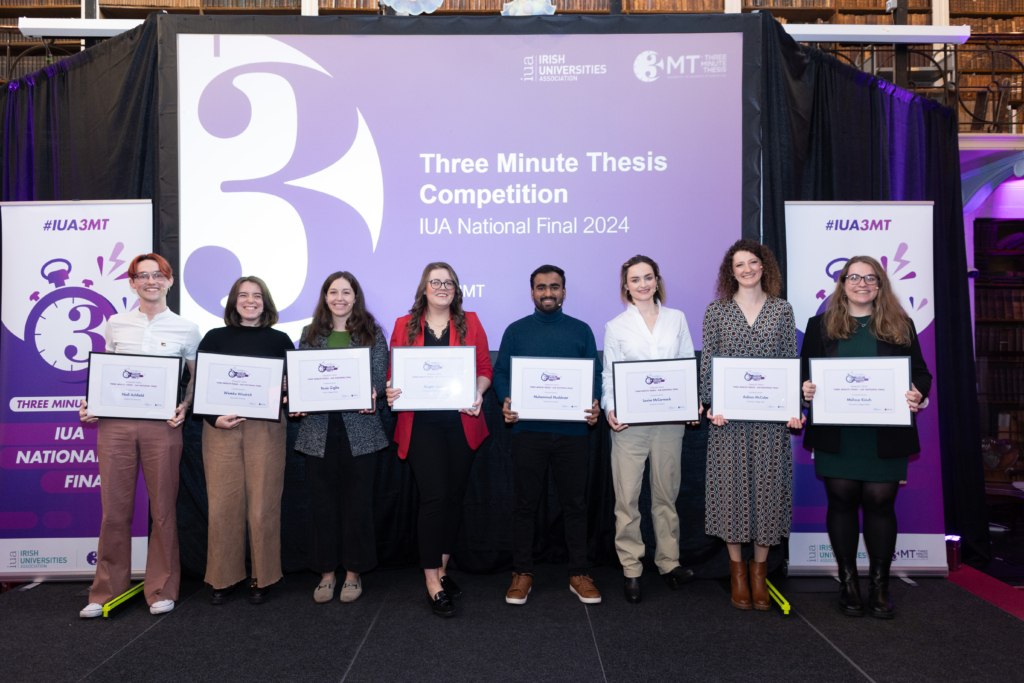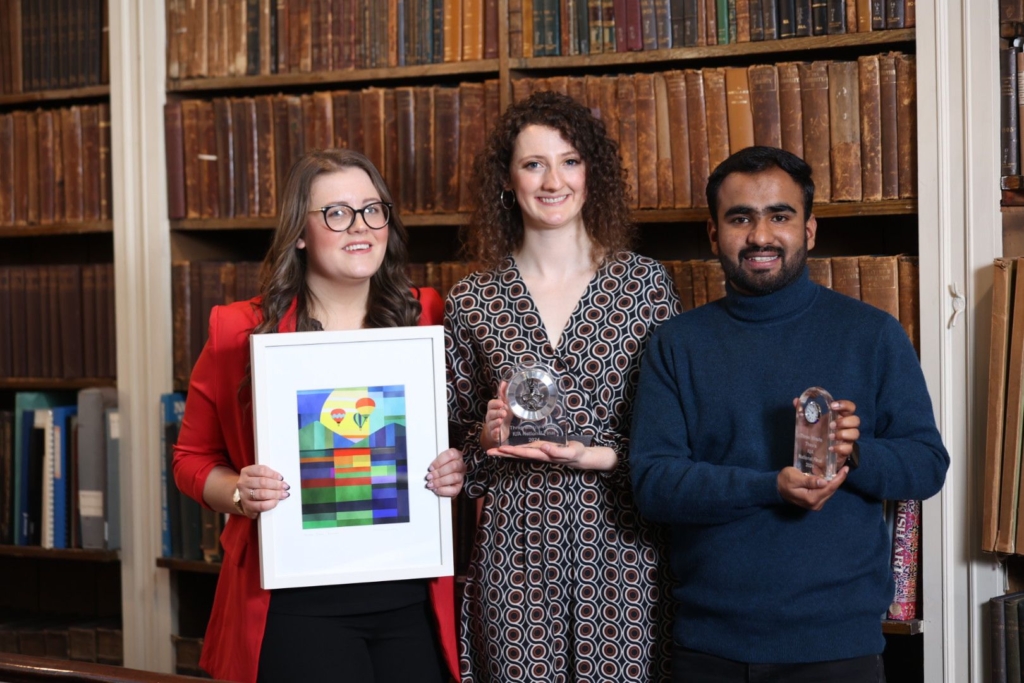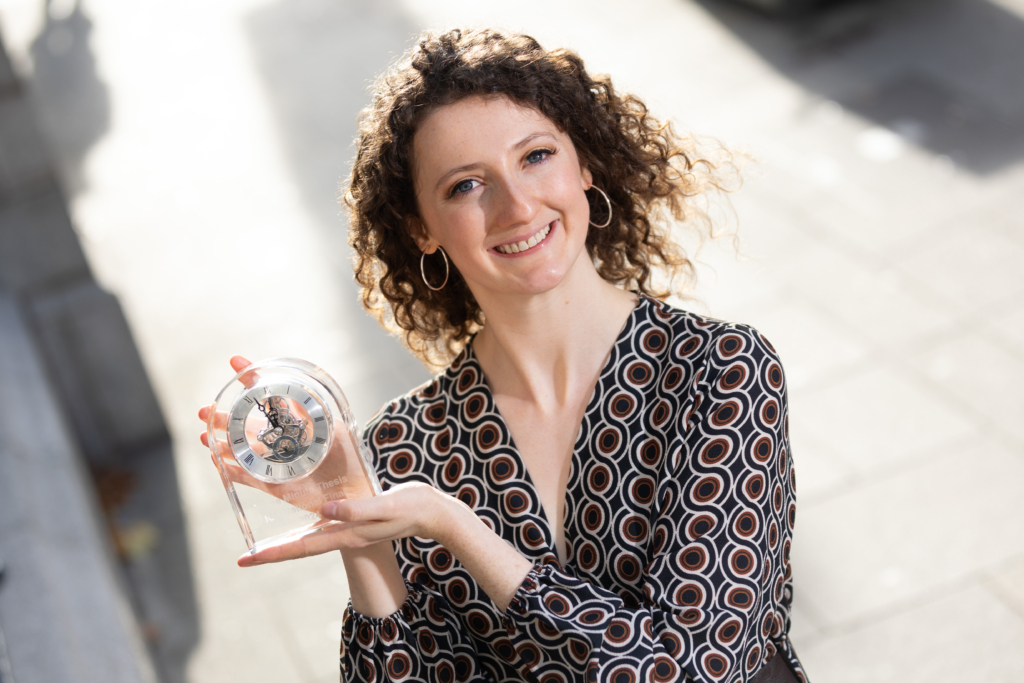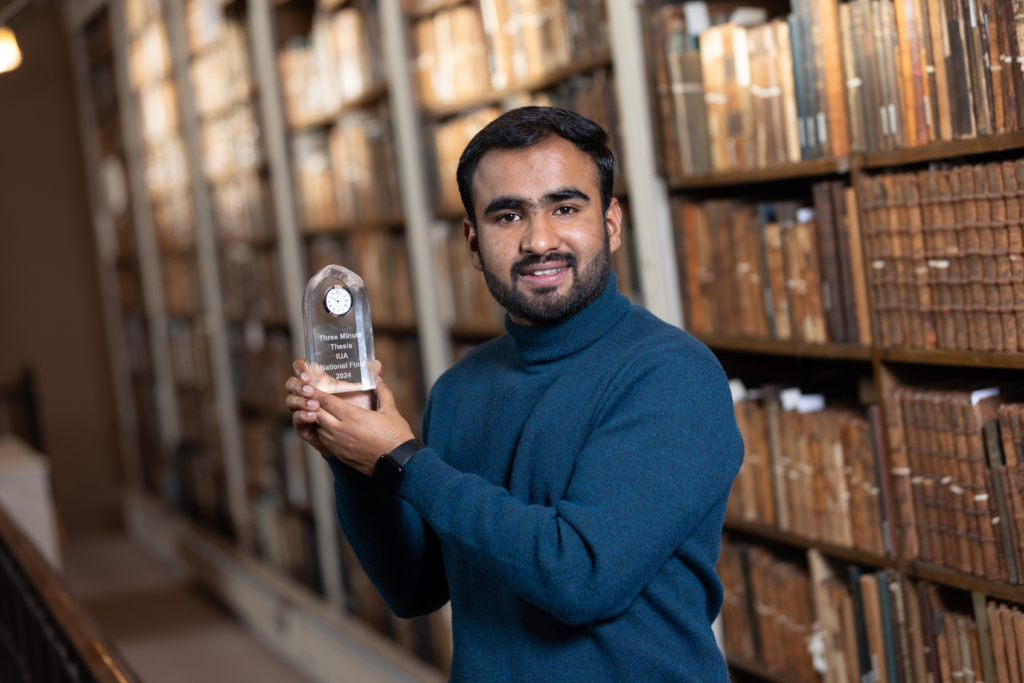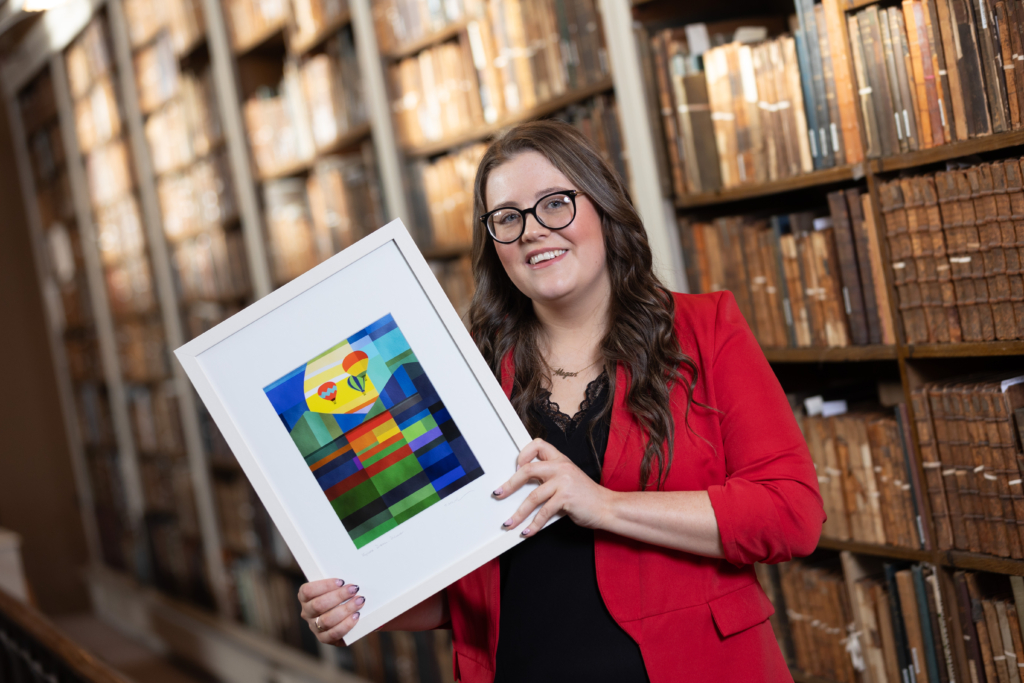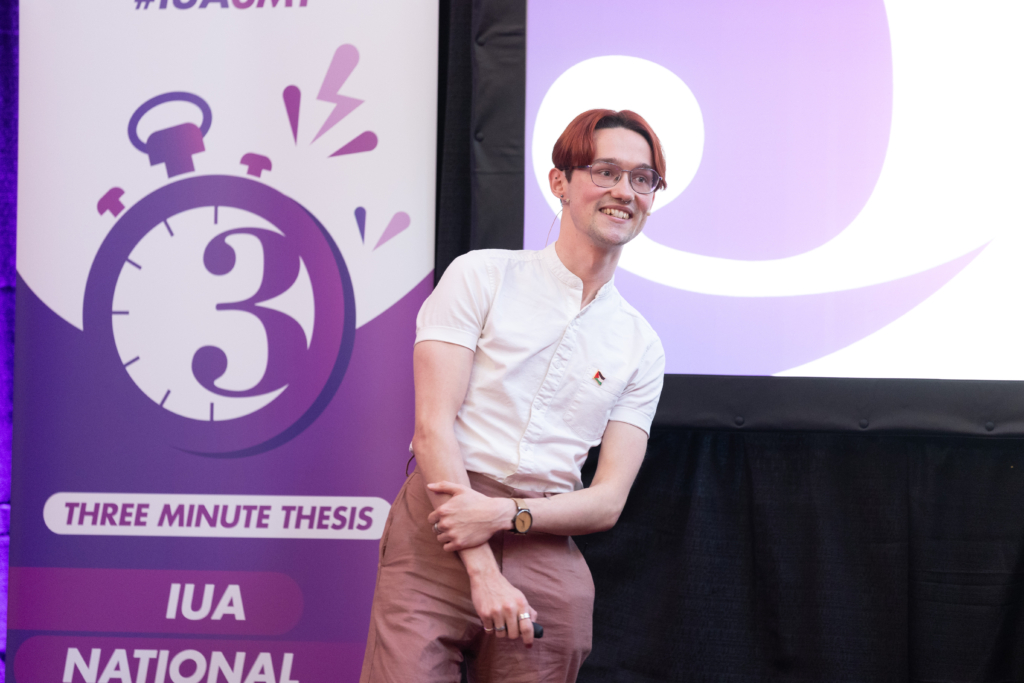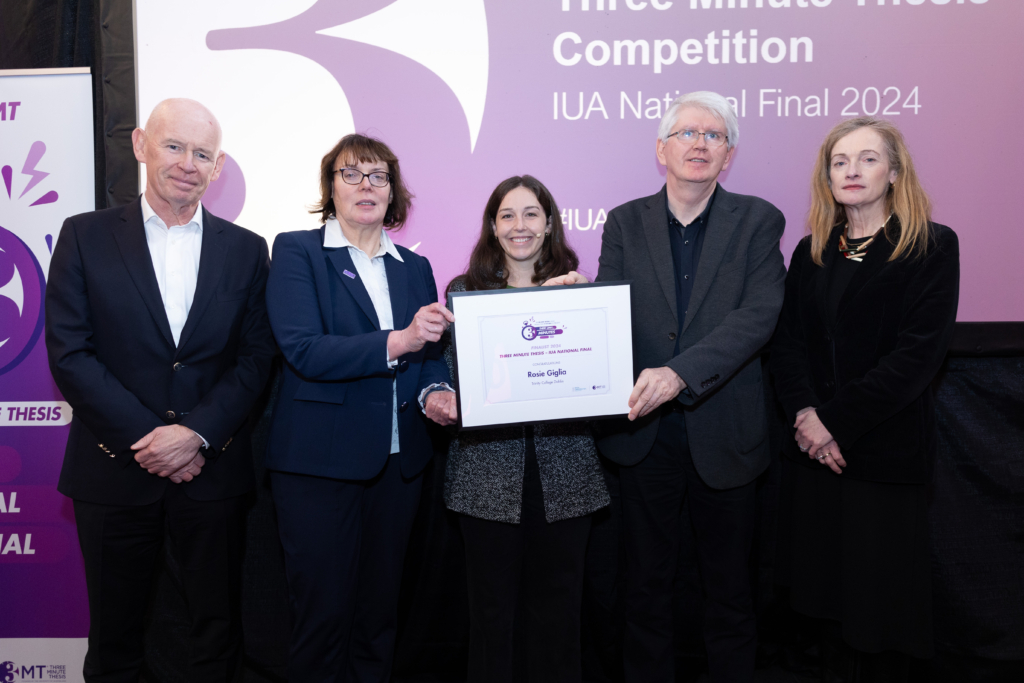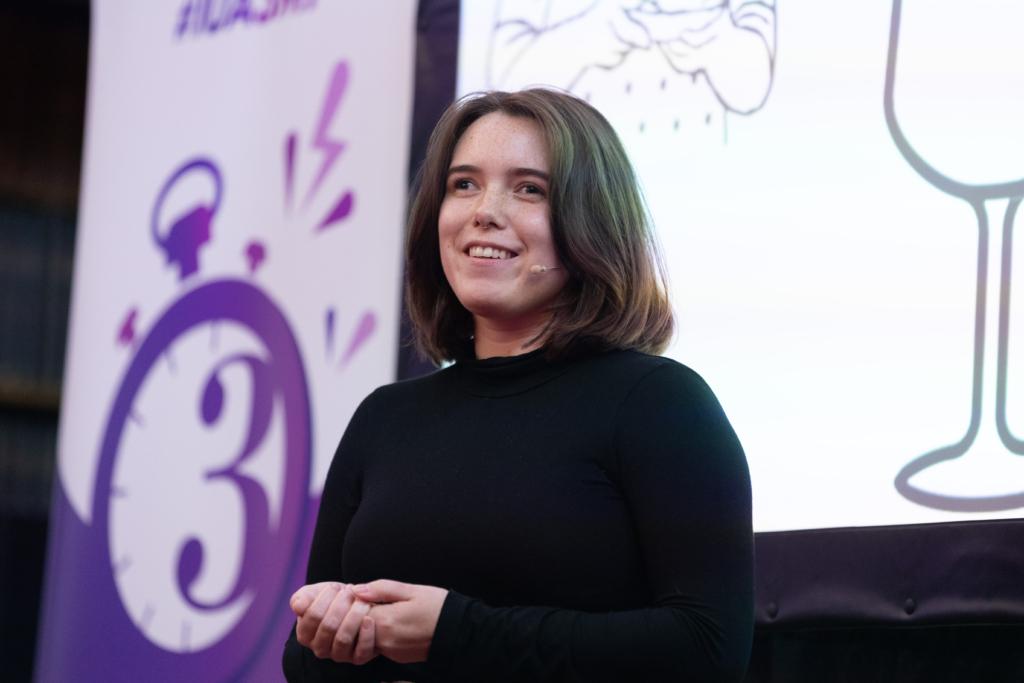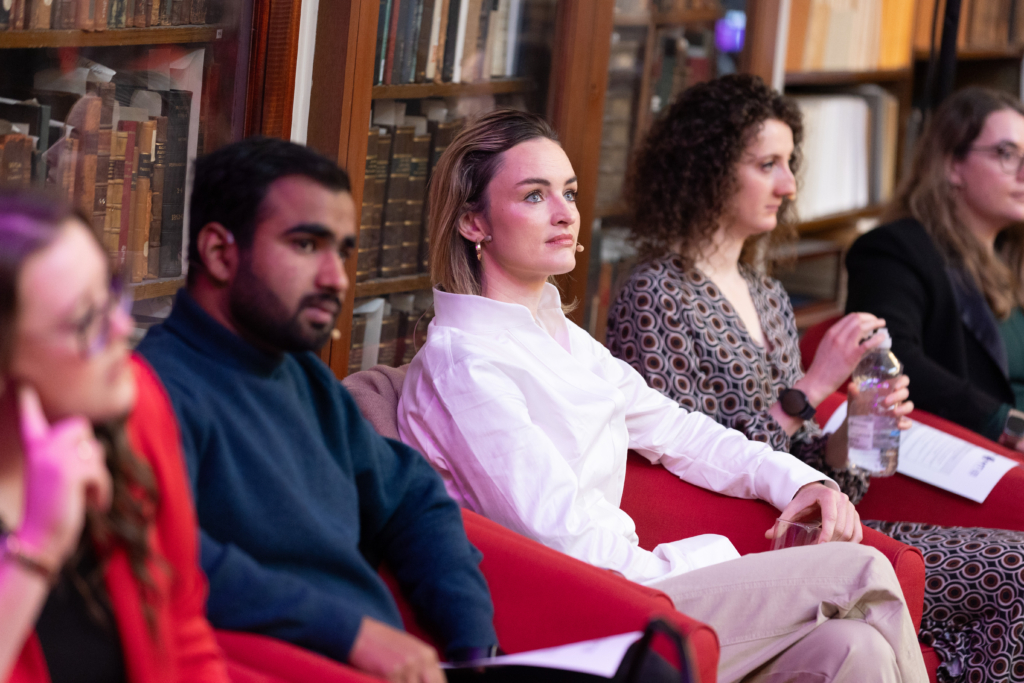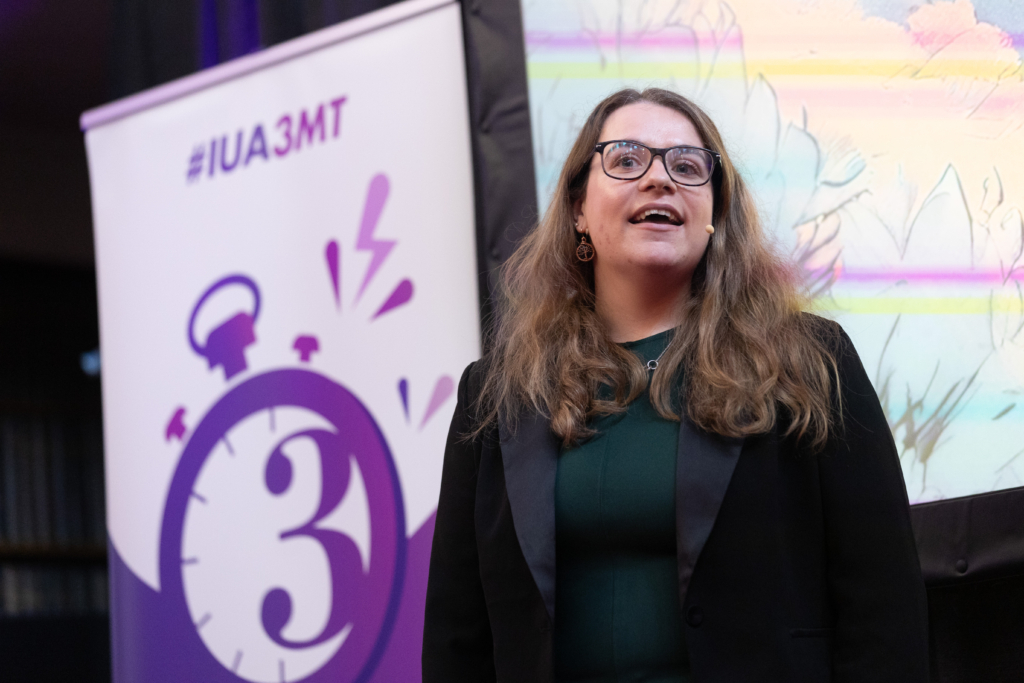On the 13th November 2024 IUA held the National ‘Three Minute Thesis’ Competition and what a thrilling event it was.
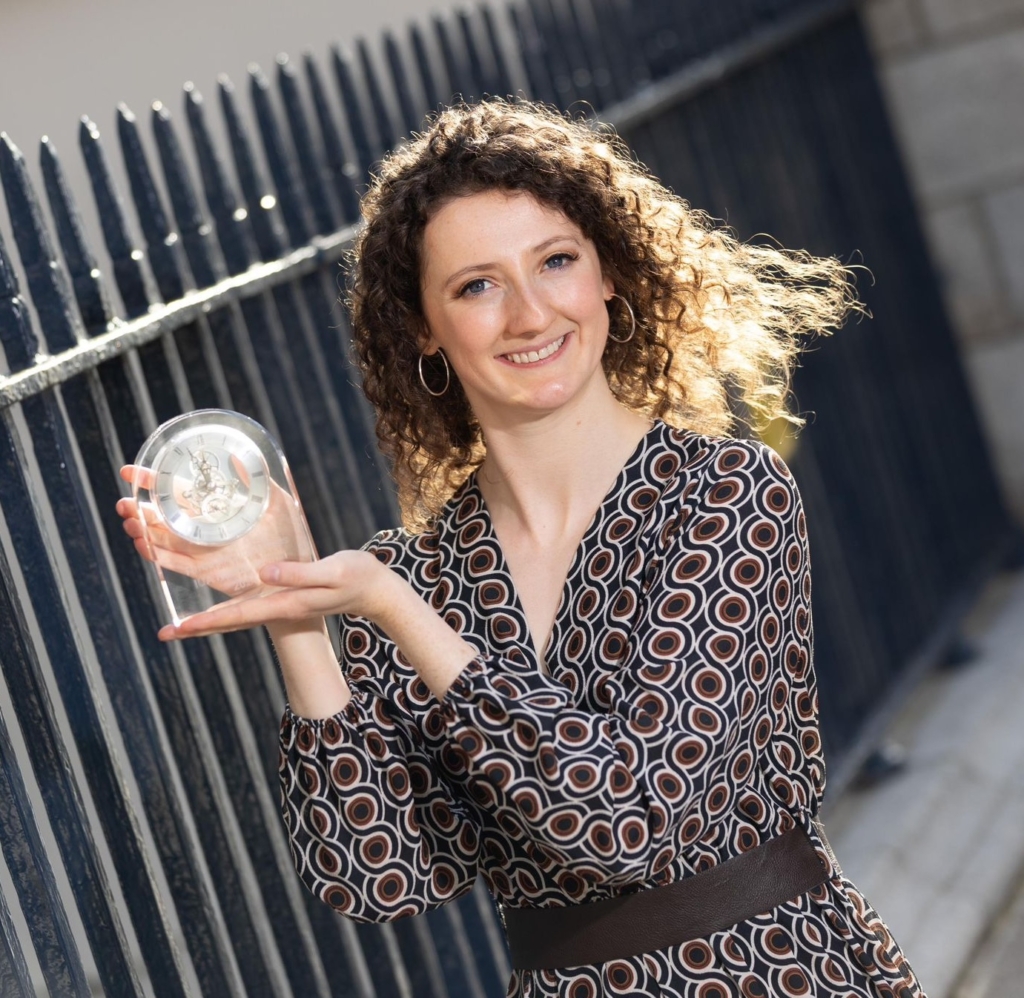
8 winners of the individual university competitions were invited to compete in the IUA national final. An 80,000 word thesis would take 9 hours to present. Their time limit was 3 minutes! The winner of the national competition was Aideen McCabe, from University College Cork. The runner-up was Muhammad Muddasar from University of Limerick. The Audience Choice winner was Megan Joyce from TU Dublin.
Three Minute Thesis (originally developed by the University of Queensland) supports graduate research students in their development as confident research communicators. Participants are challenged to present their research in three minutes, using only one slide, to a non-specialist audience. In this competition entrants must distil their niche subjects and intensive research into bite-sized presentations that will inform and entertain the general public.
Playback recording
If the video below isn’t displaying, please click here: https://www.youtube.com/watch?v=2qkIKO4nmok
Meet Our Finalists
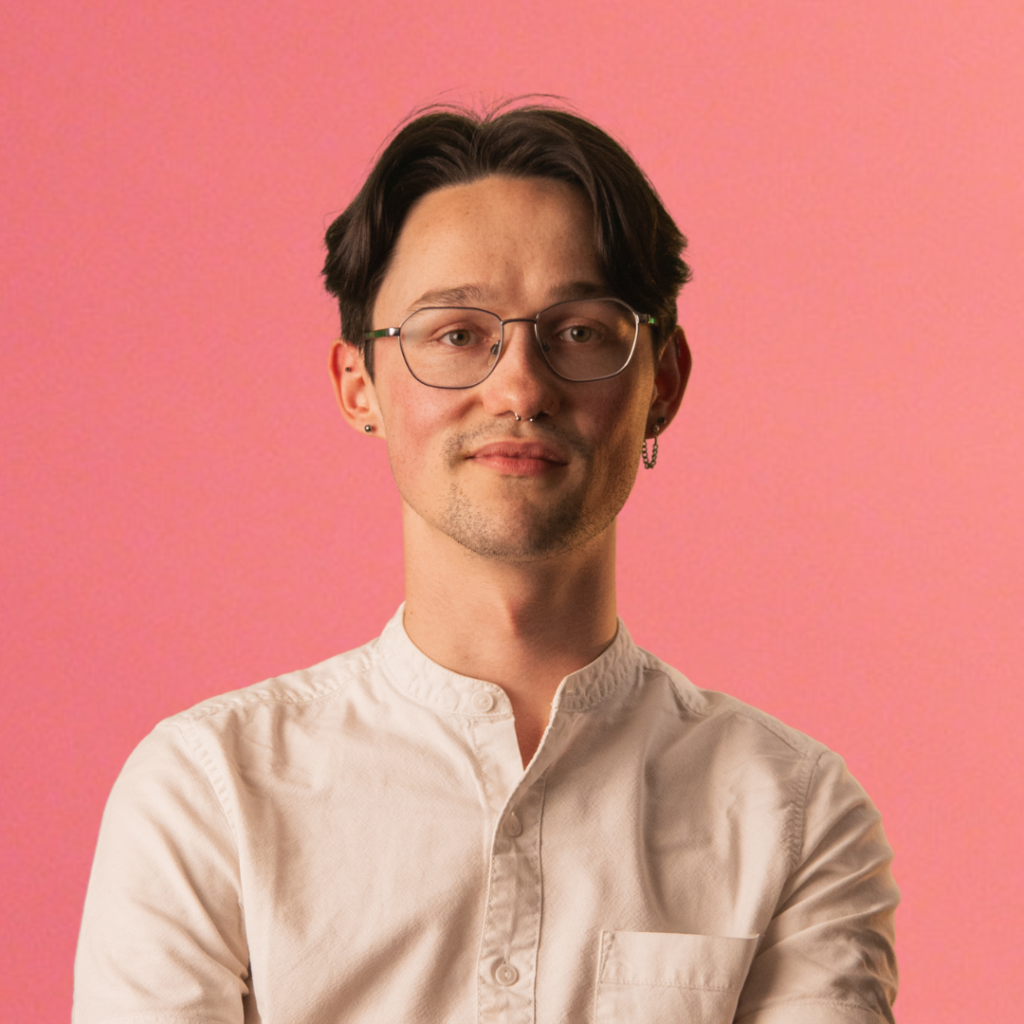
Name and Title:
Niall Ashfield
Representing DCU
Description: Faculty: School of Biotechnology
Discipline: Cancer biology
PhD Project Title: Investigating the combination of tyrosine kinase inhibitors and antibody-drug conjugates in HER2+ cancers.
Can you summarise the nature of the research you have undertaken in your PhD to date?
'My work involves using breast cancer cell lines, which are cells that have been taken from patient tumours (decades ago in some cases) and treated in such a way that they can be grown outside the human body, in flasks in the lab. We use these to study how cancers grow and how they respond to different treatments.
For example, one thing I’ve studied is how quickly each drug is taken up into the cells – to do this, I attach a dye to the drug that glows red when it’s taken into the cell. I then take pictures of the cells every hour and I can measure how quickly the drug is taken into the cell based on how much red I can see at each timepoint.
I’m very lucky to work in a collaborative environment in DCU, everybody within my own group and in other groups are always very happy to help out anytime I need. My co-supervisor Dr Amira Mahdi is also now based in UL and I’ll be carrying out some experiments there soon using an imaging instrument that we don’t have in DCU.'
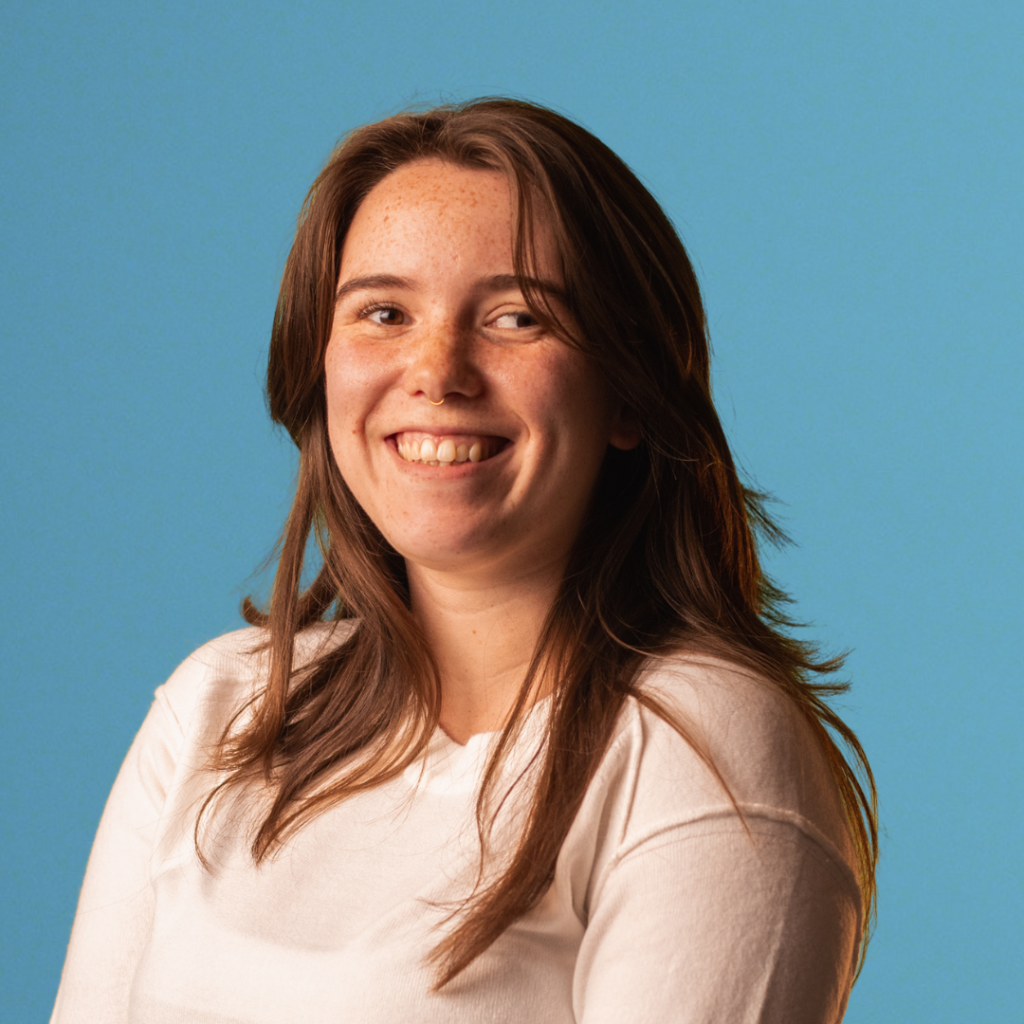
Name and Title:
Wieteke Windrich
Representing Maynooth University
Description: Faculty: School of Modern Languages, Literatures and Cultures
Discipline: First Language Attrition
PhD Project Title: Cross-Linguistic Influence of Dutch: Second Language Induced Changes of Dutch Posture Verbs.
Explain the purpose of your research, what particularly interested you in undertaking it and what impact do you hope it will have?
'I grew up in a Dutch household in the west of Ireland. My parents spoke little English, which led to me acting as their translator from a young age, I am in fact still their translator on occasion to this day. This caused me to have a heightened awareness of language, translation but also cross-cultural communication from the age of about 6. This is where my love of languages and linguistics started. When I started secondary school, I started German. As my German comprehension increased, so too did my Dutch grammar skills (as a heritage speaker of Dutch, I was never given grammar lessons).
During the course of my bachelor’s degree in German, I was given the opportunity to complete a year abroad in Germany. This is where I soon learned that my linguistic advantages might in fact be a disadvantage. I began to replace Dutch words, phrases and grammatical structures with their German counterparts. This is what led me to pursue language attrition between German and Dutch for my master’s degree.
With the experience I gained during my master’s research, I was able to niche down interests to the attrition of Dutch posture verbs. This verb type and its connotations is unique to Dutch and has remained relatively unresearched. I want to discover if native speakers can genuinely lose aspects of their native language and how their new language environment impacts their level of attrition. I also want to see what the emotional and societal implications of language attrition are for native speakers, through means of a sociolinguistic interview. The hope is to provide a scope of both the factors that cause or impact attrition, as well as understand how this actually impacts speakers.'
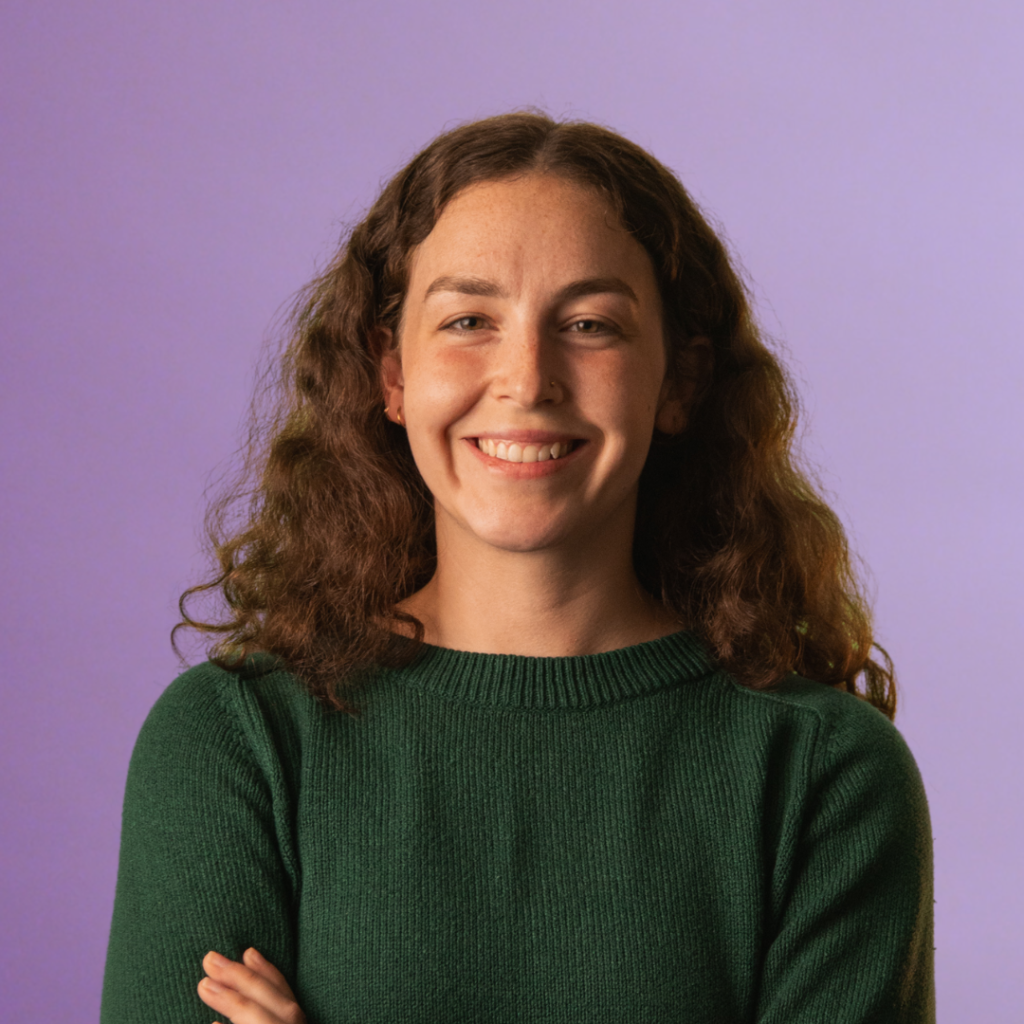
Name and Title:
Rosie Giglia
Representing Trinity College Dublin
Description: Faculty: School of Medicine (Academic Unit of Neurology)
Discipline: Clinical Medicine
PhD Project Title: Finding neurophysiological biomarkers of cognitive network dysfunction across neurodegenerative diseases: differential diagnostics, novel re-phenotyping, and clinical trial design.
What was the value of participating in your university’s ‘Thesis in 3’ competition?
'The Thesis in 3 competition was a fantastic opportunity to reflect on my project and pull out the key messages that are so easy to forget when we get bogged down in the day-to-day details of the research. A fellow PhD student in the lab convinced a few of us to try the competition in 2023, and I am so glad that we listened to her. It was a great way to practice constructing and delivering a presentation given a very specific brief, so every presentation since then has felt like a breeze in comparison! I had never really enjoyed public speaking, but the 2023 competition sparked an interest in science communication that has become one of my favorite parts of the PhD. I was excited to try the competition again this year to refine my presentation and share some additional findings.'
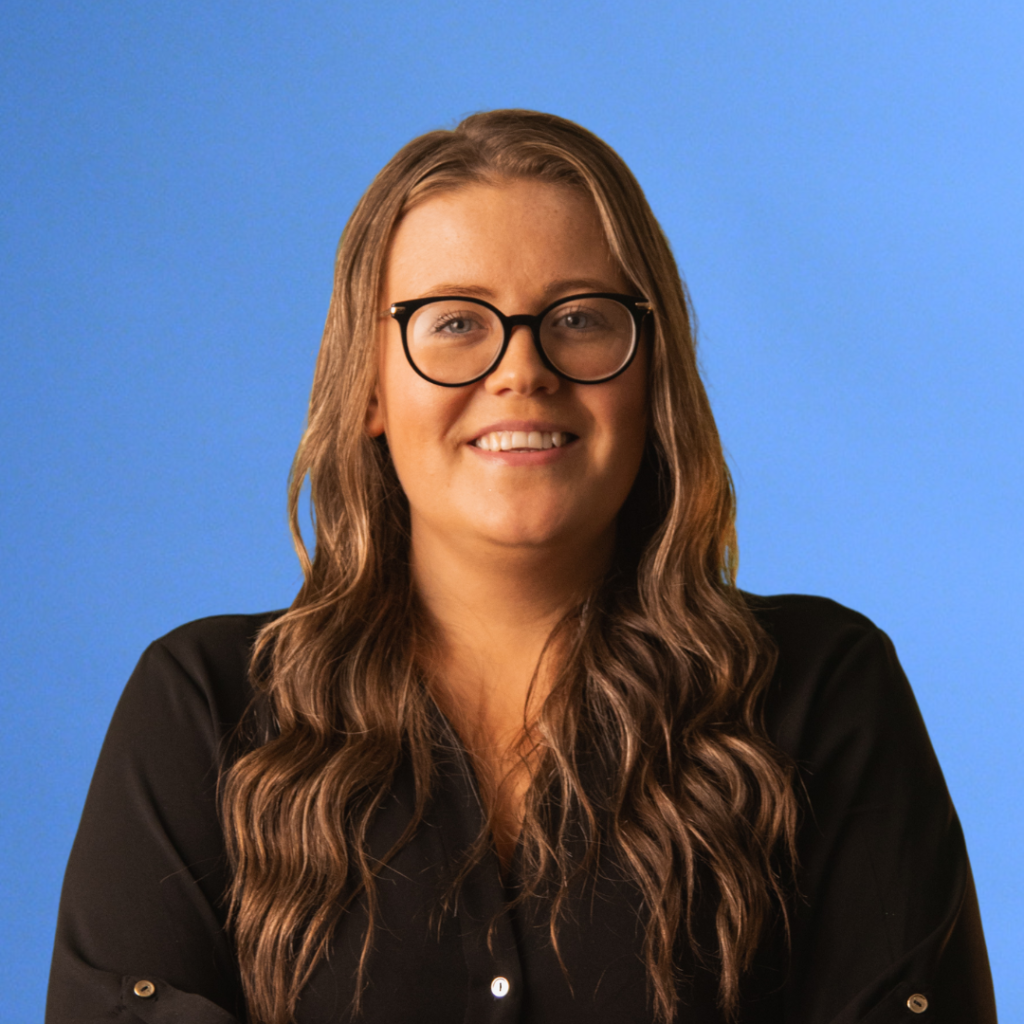
Name and Title:
Megan Joyce
Representing TU Dublin
Description: Faculty: School of Chemical and Biopharmaceutical Sciences
Discipline: Microbiology & Cell Biology
PhD Project Title: The Burden of Antimicrobial Resistance in Community Acquired Pneumonia.
Explain the purpose of your research, what particularly interested you in undertaking it and what impact do you hope it will have?
'Community acquired pneumonia is the leading cause of death among children in low-income countries. Improper antimicrobial practices are driving antibiotic resistance, highlighting the urgent need for new treatment options for many diseases. Given the limited resources and funds in low-income countries, my research aims to gain greater understanding of the infection process, particularly the bacterial resistance mechanisms and to hopefully identify cost-effective treatment options for community acquired pneumonia (CAP) by exploring novel adjunct therapies with antibiotics. The goal is to ensure that effective treatment options are available to all, as a shift in common aetiology associated with CAP may be attributing to mistreatment, particularly in low-income countries. I had a special interest in this research as my grandmother suffered from Tuberculosis in her youth and my grandfather had pneumonia in later life. I watched as they were put on various antibiotic regimes in a vain attempt to find one that worked. This made me cognisant of the importance of antibiotic stewardship.'
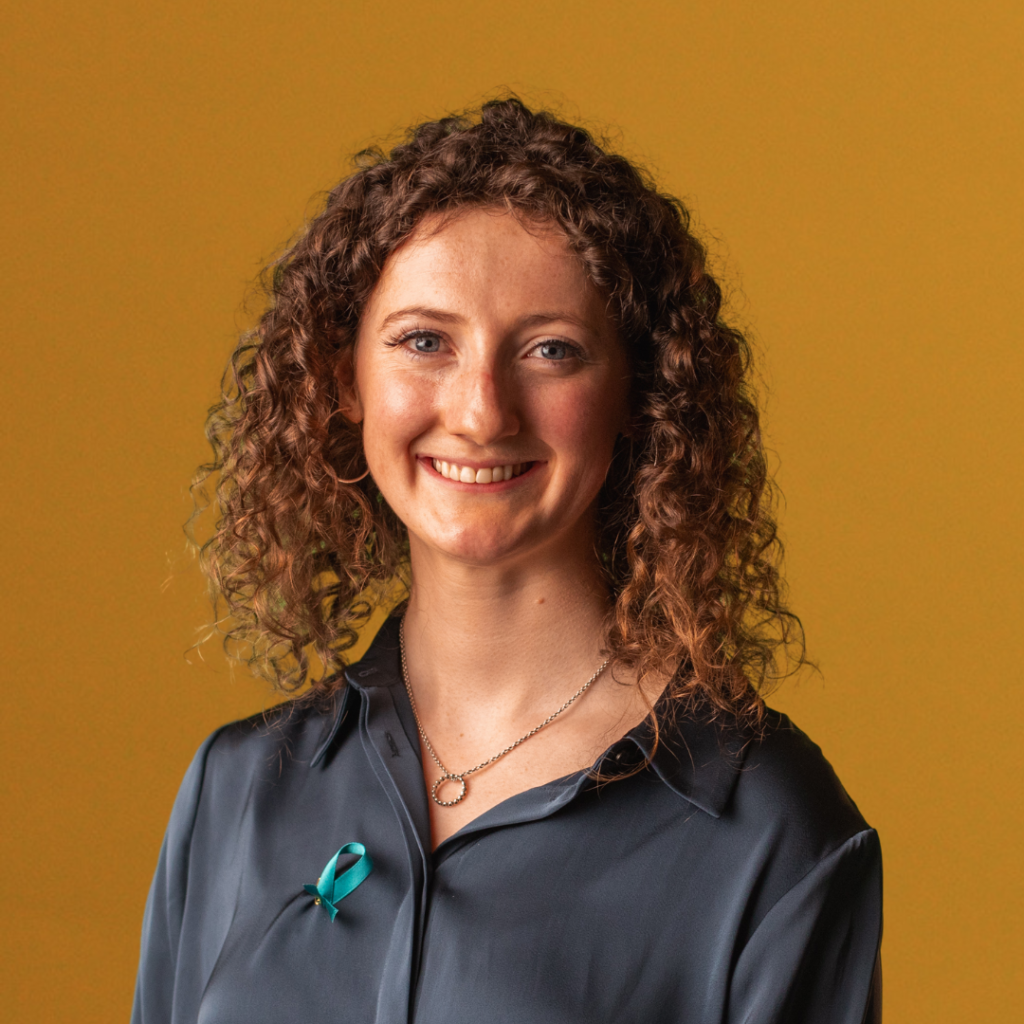
Name and Title:
Aideen McCabe
Representing UCC
Description: Faculty: School of Biochemistry and Cell Biology
Discipline: Genomics Data Science
PhD Project Title: Catching Ovarian Cancer Early: A multi-omic approach to assess expression and regulation of long, non-coding transcripts in ovarian cancer.
What impact do you hope to achieve with this work?
'My main goal for this work is to contribute towards our understanding of ovarian cancer. The more we know about this complex disease, the better we can develop new treatments and more effective ways to diagnose it. My research aims to provide scientists with the tools they need to choose the most suitable cell line models for their studies, which will improve the reliability and relevance of research focused on ovarian cancer. This can lead to more meaningful results that are applicable in real-world clinical settings. I also hope to discover biomarkers that can help identify if someone has ovarian cancer at an early stage, when it’s more treatable. Ultimately, I hope this research will have a lasting impact on women’s health by helping improve how we study ovarian cancer and how we detect it.'
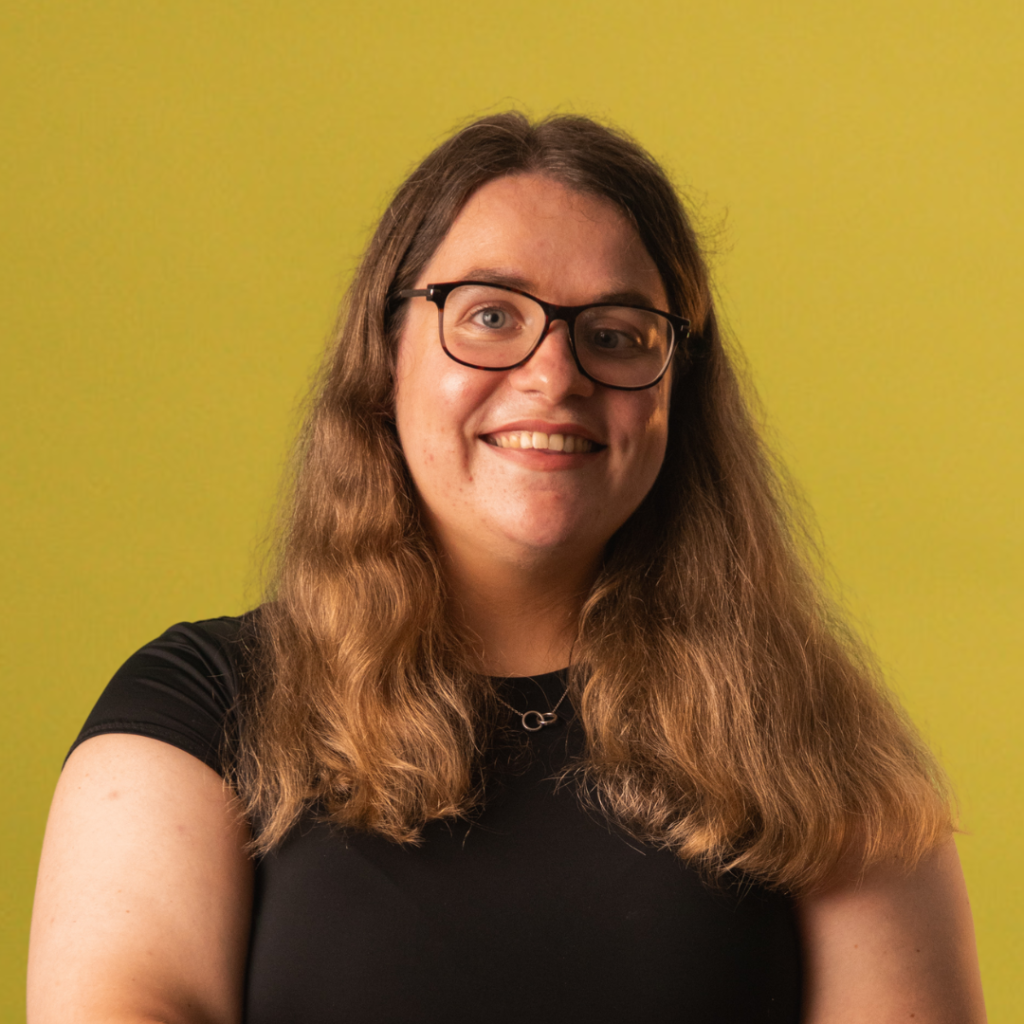
Name and Title:
Melissa Kinch
Representing UCD
Description: Faculty: School of Nursing, Midwifery & Health Systems
Discipline: Health Systems (Rare Disease)
PhD Project Title: Co-Designing a Clinical Practice Tool to Support Young People & Families living with Rare Renal Disorders with Healthcare Transition.
What impact do you hope to achieve with this work?
'At present, very little research has been undertaken to understand how young people and families living with Rare Kidney Diseases experience healthcare transition. Any research that does exist is retrospective accounts from the young people and families who have experienced the phenomenon. My research works with those currently undergoing the process and their parents/caregivers, as well as those who have completed the process. I also work closely with my clinical partner, Children’s Health Ireland and the multi-disciplinary healthcare professionals who deliver care to this cohort on a day-to-day basis. Ultimately, I envisage that this study will provide healthcare professionals, policy makers, academics and wider groups with a better understanding about how healthcare transition is experienced by this cohort, whilst developing guidance, which has been devised with the young people and families affected. The goal of this study is to simplify the transition process, resulting in better experiences and outcomes for young people and their families. Therefore, the greater goal is to ensure that young people living with rare kidney disease and their families remain healthy, both physically and mentally throughout the healthcare transition process, and are prepared to lead happy, healthy lives well into adulthood. This would lead to a healthier society, and reduced burden on families and society.'
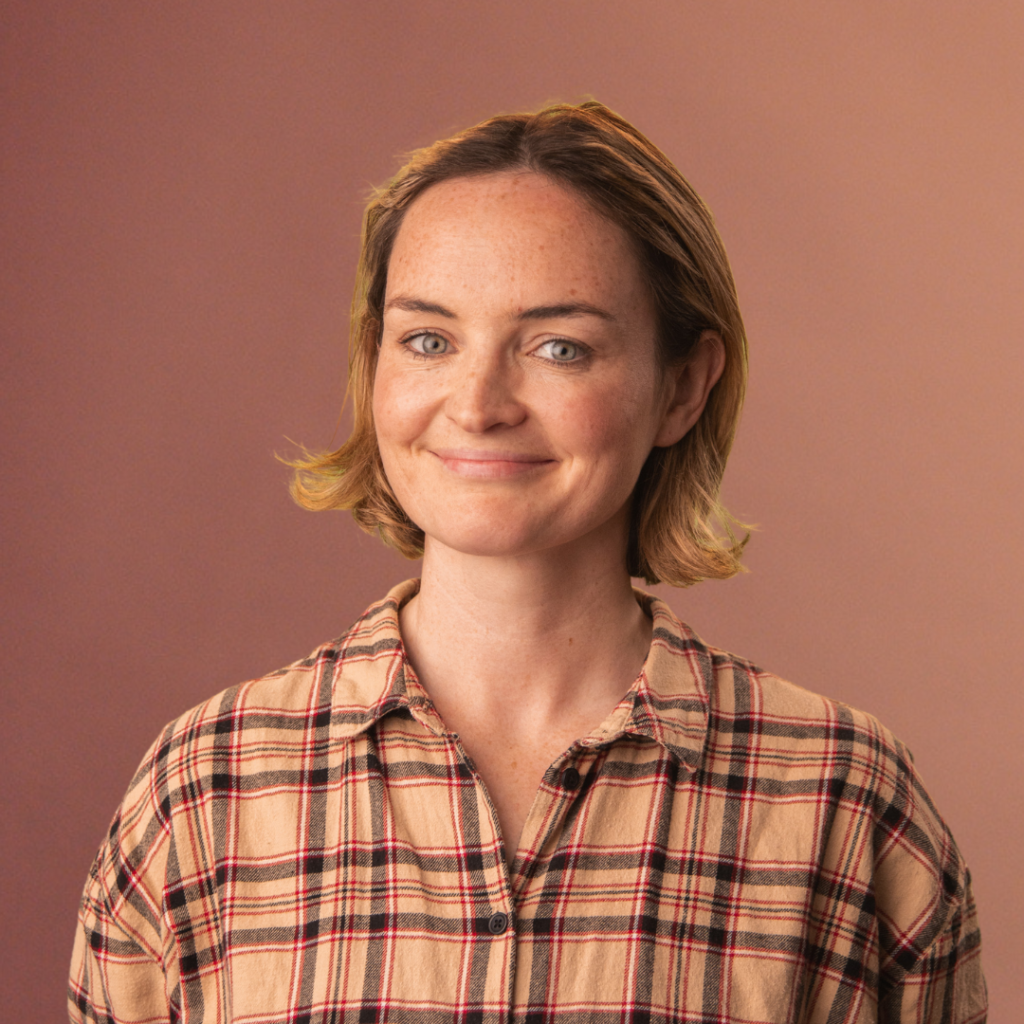
Name and Title:
Louise McCormack
Representing University of Galway
Description: Faculty: Computer Science
Discipline: Artifical Intelligence
PhD Project Title: Evaluating the Ethics and Trustworthiness of AI Systems.
Please explain the purpose of your research, what particularly interested you in undertaking it and what impact do you hope it will have?
'AI is deeply integrated into society, making decisions for us all behind the scenes. Companies monitor and collect our data and feed it into algorithms to make decisions that affect huge portions of our lives, what news we see, what user comments we see, if we get a mortgage, how much our insurance costs. This would be great, if we didn’t already know that it is biased, unfair, not transparent, and in many cases, having huge negative impacts on our societies. I am building a tool that evaluates how Trustworthy AI systems are, using the 7 principles of Trustworthy AI which underpin the EU AI Act.'
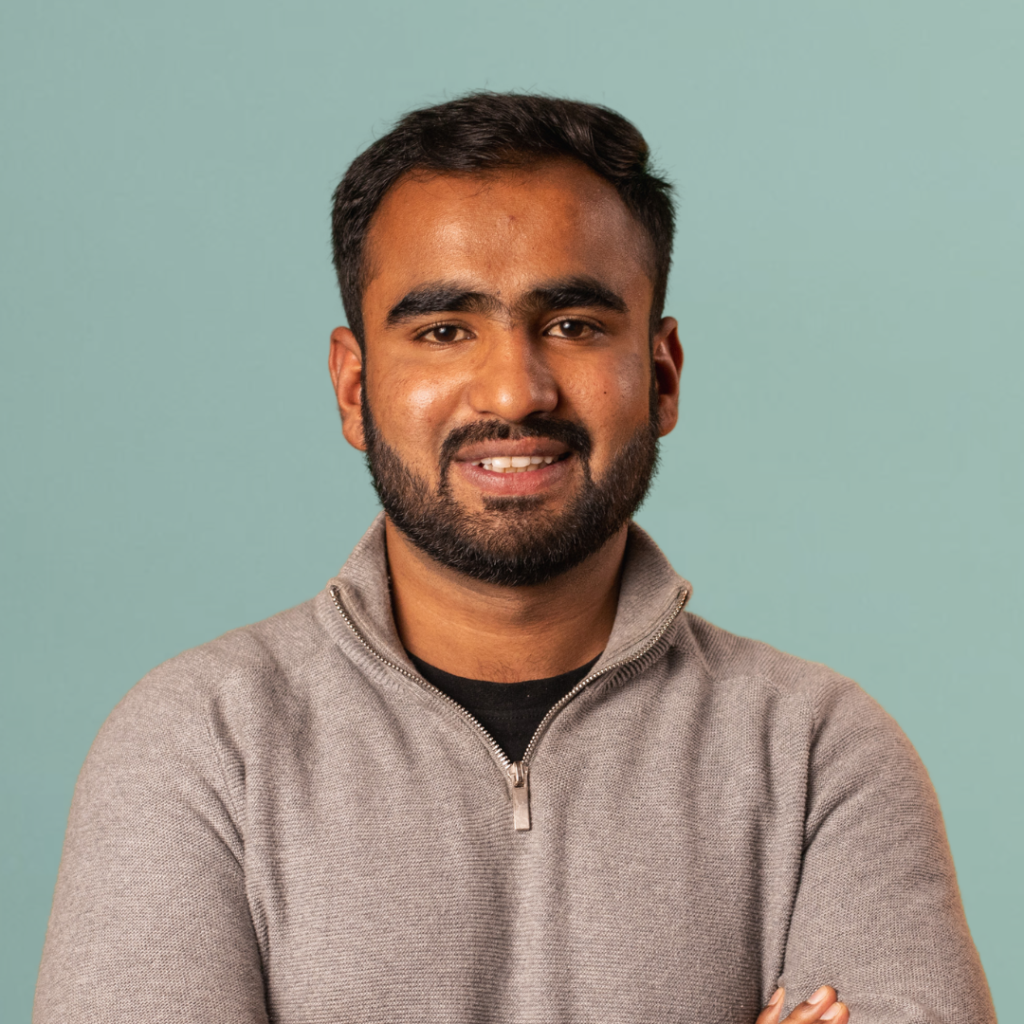
Name and Title:
Muhammad Muddasar
Representing UL
Description: Faculty: Faculty of Sciences and Engineering/School of Engineering
Discipline: Sustainable materials
PhD Project Title: Lignin-Derived Materials for Energy Harvesting and Storage Devices.
What was the value of participating in your university’s ‘Thesis in 3’ competition?
'Participating in the ‘Thesis in 3’ competition was incredibly valuable. It required me to squeeze my complex research into a clear and engaging presentation, enhancing my ability to communicate scientific concepts to a wider audience. This experience significantly improved my public speaking skills and boosted my confidence, which is essential for both academic and professional success. Additionally, the positive feedback and recognition from the competition affirmed the importance of my work and motivated me to continue pursuing my research goals with renewed enthusiasm.
Beyond these immediate benefits, the competition also provided a platform to network with fellow researchers and academics, encouraging collaborative relationships that have been beneficial for my professional growth. It encouraged me to think creatively about how to present my research, making it more accessible and interesting to diverse audiences.'
A Quick Introduction...
Meet Our Judging Panel
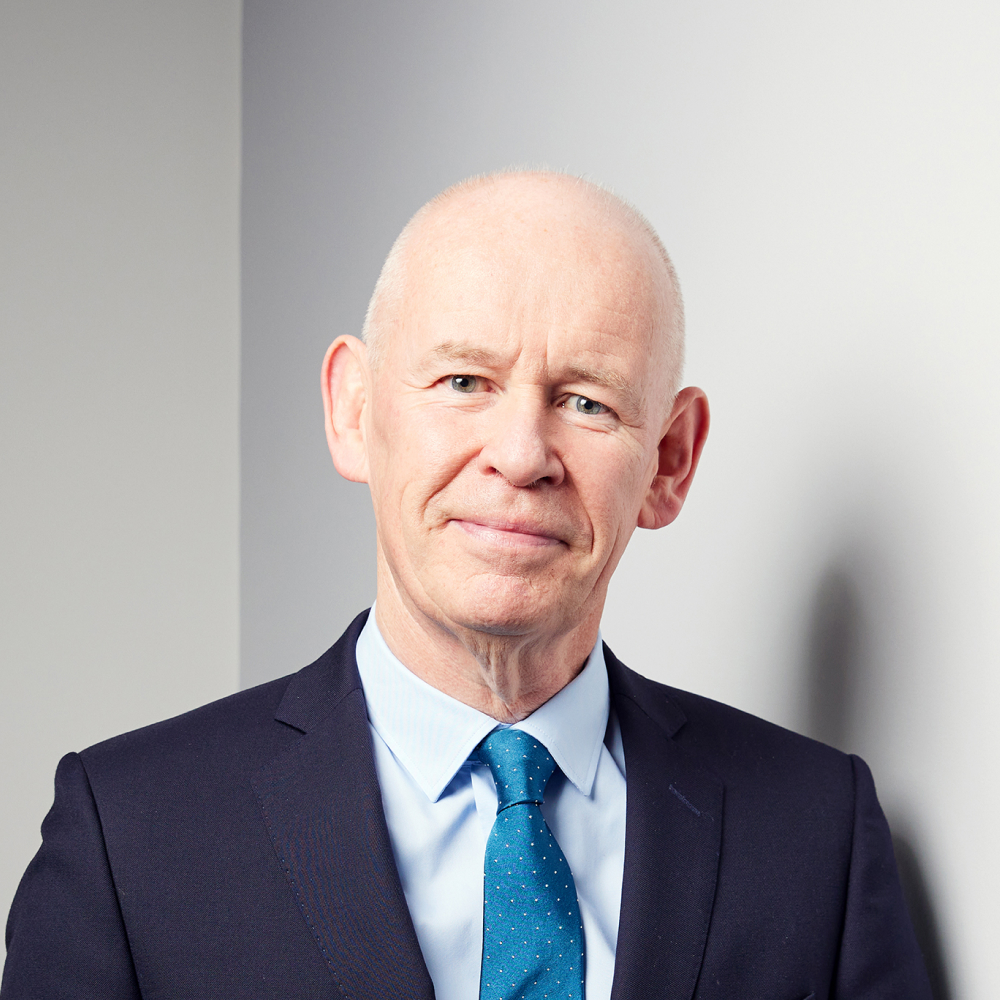
Name and Title:
Billy Murphy
Chair of Drury
Description: Billy Murphy co-founded Drury Communications in 1989 and has been Executive Chairman of the business since 2004.
Billy is one of Ireland’s foremost communications consultants specialising in C-Suite counsel, financial situations, business & society, litigation and crisis management.
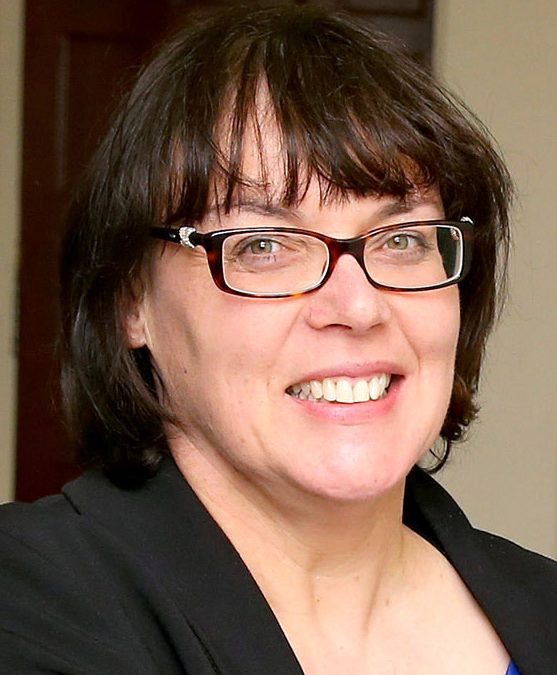
Name and Title:
Dr Eucharia Meehan
Registrar and CEO, Dublin Institute for Advanced Studies
Description: Dr Meehan has over 20 years of leadership experience across a range of public and private research based organisations. In 2017, Dr Meehan was appointed CEO at the Dublin Institute for Advanced Studies (DIAS), the only such institute in Ireland, which since its inception has focused on fundamental frontier & discovery research.
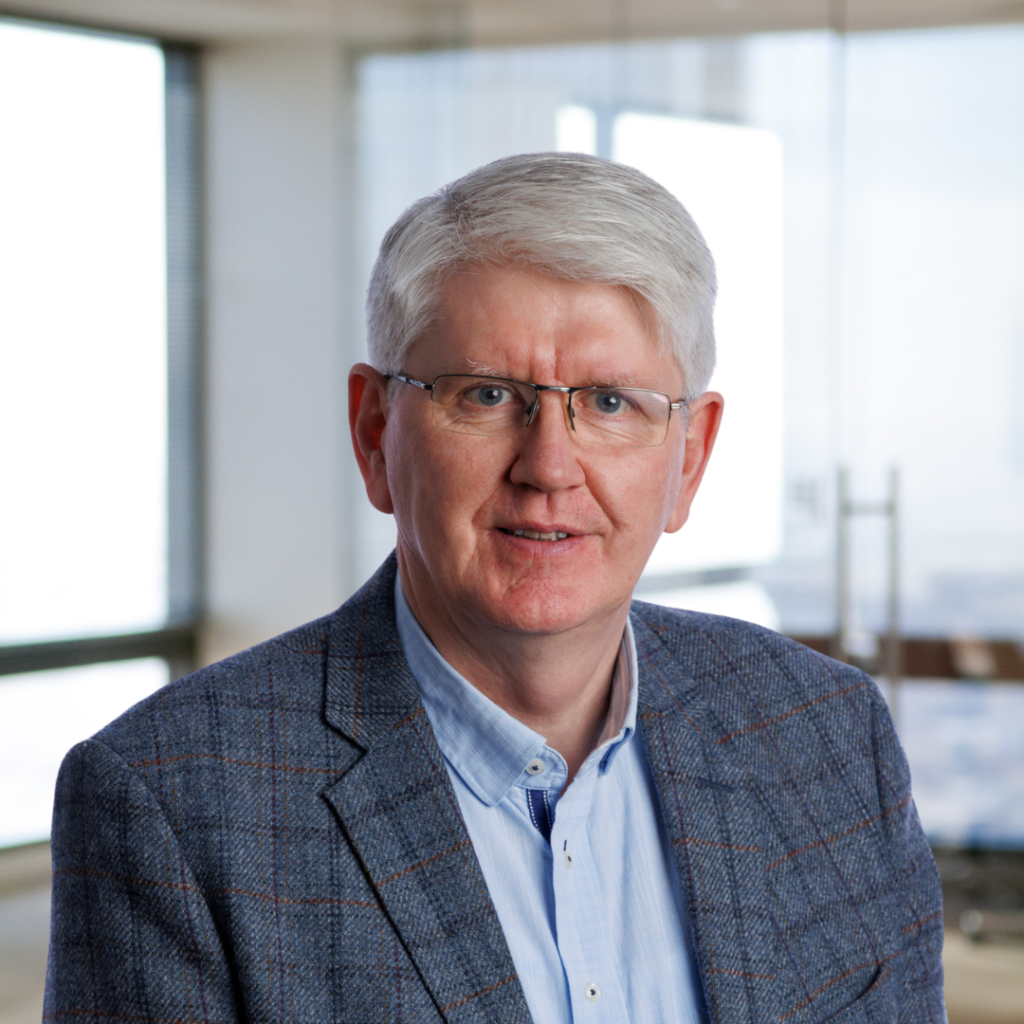
Name and Title:
Jim Miley
Director General
Link: Find out more
Description: Director General, Jim leads the IUA as the representative voice for Ireland’s research-led universities.
Jim has extensive experience across a variety of commercial, communications and campaigning roles and provides leadership to the sector at a time of significant change and challenge.
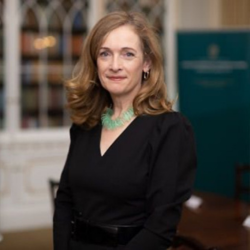
Name and Title:
Marina Donohoe
Enterprise Ireland's Head of Research and Innovation
Link: Find out more
Description: Marina Donohoe is a Divisional Manager responsible for Research & Innovation within Enterprise Ireland. Enterprise Ireland is the largest funder of applied research in Ireland working directly with clients and collaboratively with the research ecosystem to deliver economic and social impact. Marina’s division leads on DTIF, Innovation Vouchers, Innovation Partnerships, Ireland’s 4 EDIH’s and 27 Tech Centres and Gateways across the Research Ecosystem. In turn the Division manages on Knowledge Transfer Ireland and the National Office for engagement with Horizon Europe.
*The Three Minute Thesis (3MT®) is an academic research communication competition developed by The University of Queensland (UQ), Australia.
